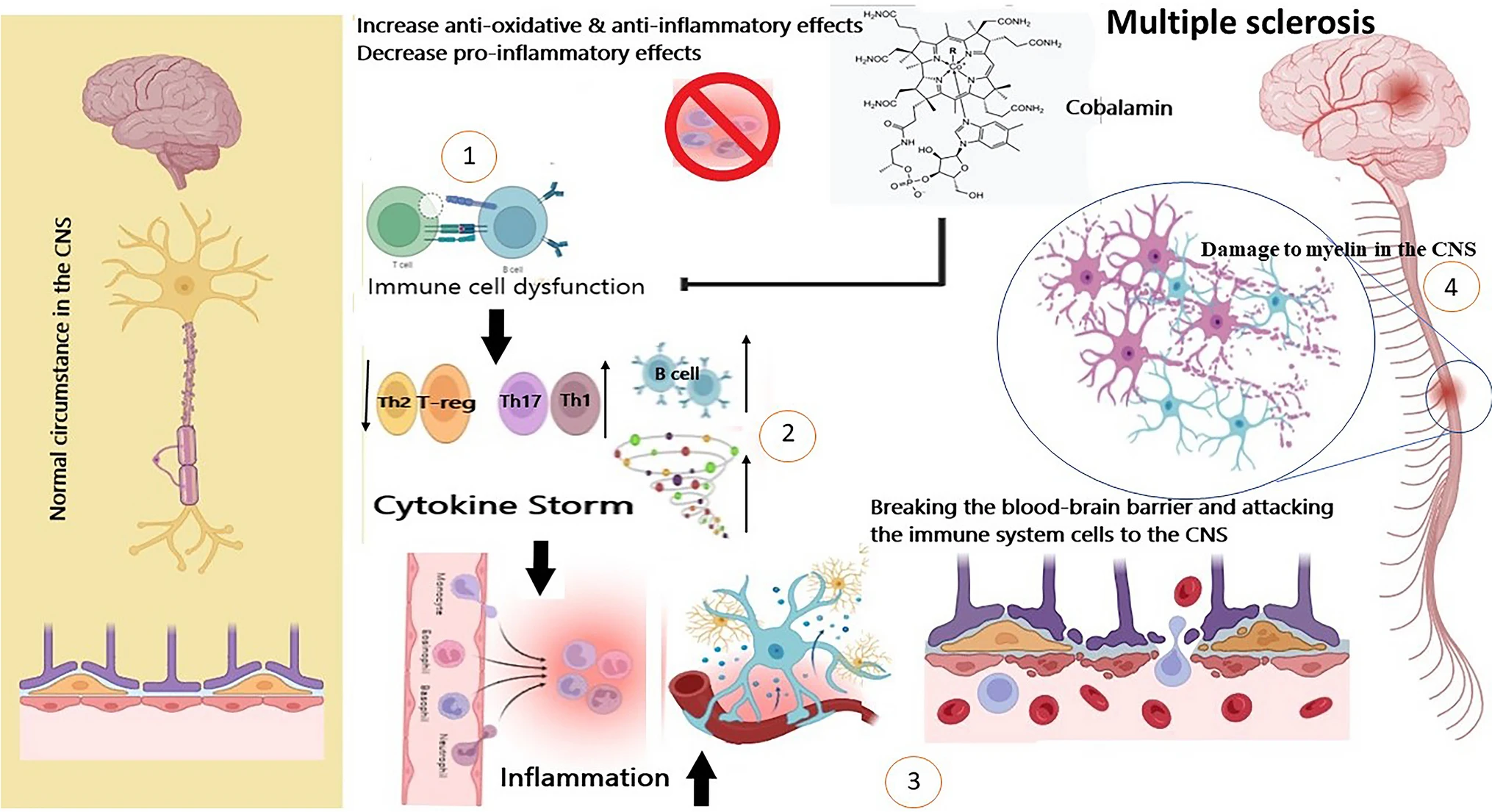Exploring Vitamin B12 in Multiple Sclerosis Management
Multiple Sclerosis (MS) is a complex immune-mediated neurodegenerative disorder characterized by the progressive degradation of the central nervous system (CNS). This degradation results from chronic neuroinflammation and demyelination, leading to significant neurological impairment. The global prevalence of MS has been increasing, with over 2.8 million individuals affected worldwide. Despite extensive research, the exact etiology of MS remains elusive, though it is widely acknowledged that both genetic and environmental factors play critical roles in its onset and progression. This blog post explores the potential therapeutic benefits of cobalamin (vitamin B12) in managing MS, as detailed in a recent review article.
Cobalamin's Role in Myelin Formation and Repair
Myelin, the protective sheath around nerve fibers, is crucial for the proper functioning of the nervous system. In MS, the immune system mistakenly attacks myelin, leading to its destruction and the subsequent disruption of nerve signal transmission. Cobalamin plays an essential role in myelin synthesis and repair. It is involved in the production of S-adenosylmethionine (SAM), a key molecule required for methylation processes that maintain myelin integrity. Studies have shown that cobalamin deficiency can lead to myelin damage, manifesting as symptoms similar to those seen in MS. Thus, ensuring adequate levels of cobalamin might help mitigate some of the demyelination associated with MS.
Cobalamin and the Immune System
Cobalamin is also vital for the proper functioning of the immune system, particularly in the production and activity of immune cells such as T cells and natural killer (NK) cells. Deficiency in cobalamin has been linked to impaired immune function, which may exacerbate the autoimmune processes underlying MS. By influencing cytokine production and promoting anti-inflammatory pathways, cobalamin could potentially modulate the immune response in MS, making it a valuable component in the management of the disease.

Cobalamin is crucial for immune system functions, including lymphocyte proliferation, cytokine modulation, and overall immune response, as it has been linked to nonspecific immunological responses in various species. (Golabi, M., et. al. (2024))
The Link Between Cobalamin Deficiency and MS
Research has highlighted a potential link between cobalamin deficiency and the onset of MS. Although there is no direct evidence proving that low levels of cobalamin cause MS, studies have observed lower cobalamin levels in MS patients compared to healthy controls. Furthermore, some MS patients with cobalamin deficiency exhibit symptoms such as cognitive impairment and visual disturbances, which may be alleviated with cobalamin supplementation. These findings suggest that maintaining adequate cobalamin levels could be crucial for individuals at risk of developing MS or those already diagnosed with the disease.
Therapeutic Potential of Cobalamin Supplementation in MS
Given the role of cobalamin in myelin formation, immune function, and overall neurological health, supplementation with cobalamin could offer therapeutic benefits for MS patients. Several studies have demonstrated improvements in neurological symptoms, cognitive function, and overall quality of life in MS patients receiving cobalamin supplementation. For example, a study by Nozari et al. found that combining folic acid and cobalamin supplementation improved both physical and mental well-being in MS patients. Additionally, cobalamin supplementation has been shown to partially restore visual acuity in patients with MS, particularly those experiencing optic nerve damage due to cobalamin deficiency.
Effects of MS Treatment on Cobalamin Levels
Certain MS treatments, such as high-dose intravenous methylprednisolone, have been found to decrease cobalamin levels in patients. This decrease could potentially exacerbate neurological symptoms and reduce the effectiveness of other therapies. Therefore, monitoring and managing cobalamin levels in MS patients undergoing treatment is essential to minimize complications and optimize therapeutic outcomes. On the other hand, some treatments, like glatiramer acetate, do not appear to affect cobalamin levels, indicating that the impact of MS therapies on cobalamin status may vary depending on the specific treatment regimen.
Future Directions and Conclusion
While the relationship between cobalamin and MS is still under investigation, current evidence suggests that maintaining adequate cobalamin levels could play a significant role in managing the disease. Further research is needed to fully understand the mechanisms by which cobalamin influences MS progression and to establish standardized guidelines for cobalamin supplementation in MS patients. Nevertheless, the potential benefits of cobalamin in mitigating neurological damage, supporting immune function, and improving the quality of life in MS patients make it a promising area of study.
In conclusion, cobalamin supplementation may offer a valuable therapeutic strategy for improving MS symptoms and slowing disease progression. As researchers continue to explore the complex interplay between cobalamin and MS, patients and clinicians alike may benefit from considering cobalamin as part of a comprehensive approach to managing this challenging neurodegenerative condition.
References:
Golabi, M., Kazemi, D., Chadeganipour, A. S., Fouladseresht, H., Sullman, M. J., Ghezelbash, B., ... & Eskandari, N. (2024). The Role of Cobalamin in Multiple Sclerosis: An Update. Inflammation, 1-16.

